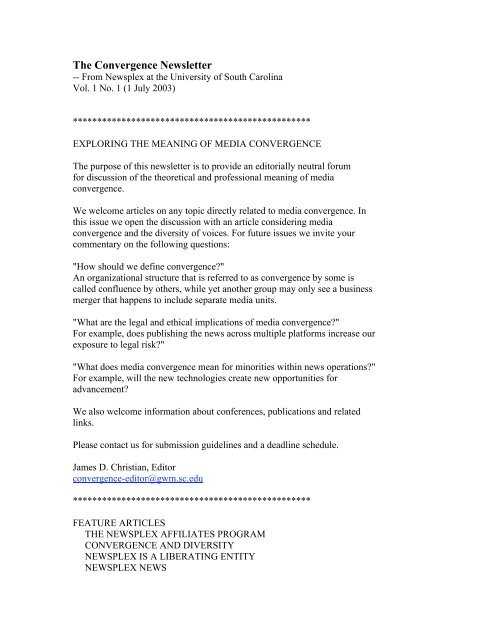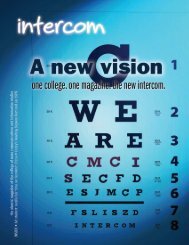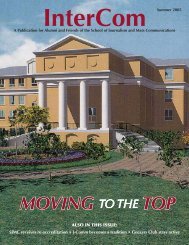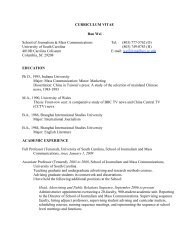The Convergence Newsletter - School of Journalism and Mass ...
The Convergence Newsletter - School of Journalism and Mass ...
The Convergence Newsletter - School of Journalism and Mass ...
Create successful ePaper yourself
Turn your PDF publications into a flip-book with our unique Google optimized e-Paper software.
<strong>The</strong> <strong>Convergence</strong> <strong>Newsletter</strong><br />
-- From Newsplex at the University <strong>of</strong> South Carolina<br />
Vol. 1 No. 1 (1 July 2003)<br />
*************************************************<br />
EXPLORING THE MEANING OF MEDIA CONVERGENCE<br />
<strong>The</strong> purpose <strong>of</strong> this newsletter is to provide an editorially neutral forum<br />
for discussion <strong>of</strong> the theoretical <strong>and</strong> pr<strong>of</strong>essional meaning <strong>of</strong> media<br />
convergence.<br />
We welcome articles on any topic directly related to media convergence. In<br />
this issue we open the discussion with an article considering media<br />
convergence <strong>and</strong> the diversity <strong>of</strong> voices. For future issues we invite your<br />
commentary on the following questions:<br />
"How should we define convergence?"<br />
An organizational structure that is referred to as convergence by some is<br />
called confluence by others, while yet another group may only see a business<br />
merger that happens to include separate media units.<br />
"What are the legal <strong>and</strong> ethical implications <strong>of</strong> media convergence?"<br />
For example, does publishing the news across multiple platforms increase our<br />
exposure to legal risk?"<br />
"What does media convergence mean for minorities within news operations?"<br />
For example, will the new technologies create new opportunities for<br />
advancement?<br />
We also welcome information about conferences, publications <strong>and</strong> related<br />
links.<br />
Please contact us for submission guidelines <strong>and</strong> a deadline schedule.<br />
James D. Christian, Editor<br />
convergence-editor@gwm.sc.edu<br />
*************************************************<br />
FEATURE ARTICLES<br />
THE NEWSPLEX AFFILIATES PROGRAM<br />
CONVERGENCE AND DIVERSITY<br />
NEWSPLEX IS A LIBERATING ENTITY<br />
NEWSPLEX NEWS
CONFERENCE INFORMATION<br />
ASSOCIATION FOR EDUCATION IN JOURNALISM AND MASS<br />
COMMUNICATION<br />
NEW RESEARCH FOR NEW MEDIA: INOVATIVE RESEARCH<br />
METHODOLOGIES<br />
HIGHWAY AFRICA CONFERENCE<br />
4th INTERNATIONAL SUMMIT ON NEWSROOMS<br />
ONLINE NEWS ASSOCIATION CONFERENCE<br />
BROADCAST EDUCATION ASSOCIATION<br />
ANNOUNCEMENTS<br />
AFFILIATE PROFILE REQUEST<br />
RELATED LINKS<br />
COPYRIGHT AND REDISTRIBUTION<br />
SUBSCRIBE/UNSUBSCRIBE INFORMATION<br />
***** FEATURE ARTICLES<br />
THE NEWSPLEX AFFILIATES PROGRAM<br />
<strong>The</strong> Newsplex Affiliates program was created in 2001 to engage educational<br />
institutions in the process <strong>of</strong> sharing information about the training <strong>of</strong> the<br />
next generation <strong>of</strong> journalists. <strong>The</strong> initial goal was to involve recognized<br />
institutions from around the world that were engaged in the research <strong>and</strong><br />
teaching in converged journalistic practices in the Newsplex mission <strong>of</strong><br />
teaching <strong>and</strong> research in convergent journalism.<br />
Since that time, we have identified dozens <strong>of</strong> educational institutions that<br />
have made convergence an integral part <strong>of</strong> their curriculum. Many <strong>of</strong> these<br />
schools have come to Newsplex to get information that will help them design<br />
facilities <strong>and</strong>/or curricula. Through these visits, as well as in conference<br />
presentations <strong>and</strong> a great deal <strong>of</strong> interpersonal communication, it has become<br />
clear that each <strong>of</strong> these programs has important lessons to share, <strong>and</strong> that<br />
the Newsplex Affiliates program could serve as the clearinghouse for this<br />
information.<br />
<strong>The</strong> University <strong>of</strong> South Carolina has thus decided to open the Newsplex<br />
Affiliates program to any institution that is engaged in teaching <strong>and</strong><br />
research in convergent journalism. <strong>The</strong> criteria for membership are:<br />
Each institution must provide a comprehensive description <strong>of</strong> their<br />
journalism curriculum that will be shared with other schools through this<br />
newsletter <strong>and</strong> through the Newsplex Web site (Newsplex.sc.edu). (For more<br />
information on these descriptions, see the related article later in this
newsletter.)<br />
Each institution must agree to contribute at least one article a year to<br />
this newsletter. Articles can explore theoretical, practical, or critical<br />
aspects <strong>of</strong> convergent media, <strong>and</strong> should be <strong>of</strong> interest to both academics <strong>and</strong><br />
media pr<strong>of</strong>essionals.<br />
In return for joining the Newsplex Affiliates program, a school will receive<br />
a number <strong>of</strong> benefits. <strong>The</strong> primary benefit is the exchange <strong>of</strong> information<br />
with others involved in teaching <strong>and</strong> research in convergent media, with<br />
other benefits including a) subscription to this newsletter for all<br />
interested faculty, staff, <strong>and</strong> students, b) discounted registration fees for<br />
Newsplex-related academic conferences <strong>and</strong> c) discounted academic training at<br />
Newsplex. <strong>The</strong> goal <strong>of</strong> the program is to make the Newsplex Affiliates program<br />
a comprehensive forum for faculty <strong>and</strong> pr<strong>of</strong>essional exchange on media<br />
convergence, involving Affiliates to the greatest extent possible in the<br />
information exchange.<br />
<strong>The</strong> Newsplex Affiliates program began with twelve affiliates: the <strong>Journalism</strong><br />
Research <strong>and</strong> Development Centre at the University <strong>of</strong> Tampere in Finl<strong>and</strong>, New<br />
Directions for News <strong>and</strong> the Institute for New Media at the University <strong>of</strong><br />
Minnesota, <strong>The</strong> Paris-based World Editors Forum, the Netherl<strong>and</strong>s-based<br />
European <strong>Journalism</strong> Centre, Sweden's Royal Institute <strong>of</strong> Technology, the<br />
<strong>School</strong> <strong>of</strong> Communication <strong>and</strong> Information at Nany<strong>and</strong> Technological University<br />
in Singapore, the University <strong>of</strong> Hong Kong <strong>Journalism</strong> <strong>and</strong> Media Studies<br />
Centre, the Paris-based Centre de Formation et de Perfectionnement des<br />
Journalistes, the University <strong>of</strong> Navarra in Spain, the Media Center @ the<br />
American Press Institute in Virginia, the Missouri <strong>School</strong> <strong>of</strong> <strong>Journalism</strong> <strong>and</strong><br />
the Erich-Brost-Institut Für <strong>Journalism</strong>us at the University <strong>of</strong> Dortmund,<br />
Germany. <strong>The</strong>se twelve original Newsplex Affiliates have been designated as<br />
"Charter Affiliates" <strong>and</strong> will receive all <strong>of</strong> the benefits <strong>of</strong> membership.<br />
Although they are not required to submit further materials to maintain their<br />
membership, we anticipate that these institutions will be as eager as the<br />
newcomers to share information on their programs.<br />
As the program matures, our goal is to develop other means <strong>of</strong> sharing<br />
information among affiliates. Information shared in these newsletters,<br />
especially information on curricula, will also be posted on the Newsplex Web<br />
site. Suggestions on other information sources should be directed to Augie<br />
Grant at the University <strong>of</strong> South Carolina. (Possibilities include an<br />
electronic journal, listserv <strong>and</strong> research exchange.)<br />
To become a Newsplex Affiliate, a school simply needs to send a letter <strong>of</strong><br />
interest that includes a commitment to produce at least one article for this<br />
newsletter, along with a description <strong>of</strong> their curriculum, to:<br />
Augie Grant, Ph.D., Newsplex Academic Liaison
College <strong>of</strong> <strong>Mass</strong> Communications <strong>and</strong> Information Studies<br />
University <strong>of</strong> South Carolina<br />
Carolina Coliseum<br />
Columbia, South Carolina 29208<br />
U.S.A.<br />
Requests can also be sent via e-mail (augie@sc.edu) or fax (803.777.4103).<br />
You can also telephone, if you have questions about the program:<br />
803.777.4464.<br />
CONVERGENCE AND DIVERSITY<br />
One recurring theme in popular press discussions <strong>of</strong> media convergence is the<br />
challenge that media convergence represents to diversity. Most <strong>of</strong> these<br />
discussions refer to "diversity <strong>of</strong> voices," but few <strong>of</strong> these <strong>of</strong>fer a<br />
definition <strong>of</strong> the concept.<br />
<strong>The</strong> regulatory debate <strong>of</strong>fers an opportunity for academic researchers to<br />
define <strong>and</strong> explore the concept <strong>of</strong> diversity in greater depth. <strong>The</strong> literature<br />
in media economics includes a number <strong>of</strong> studies that address <strong>and</strong> define<br />
diversity <strong>of</strong> program content <strong>and</strong> diversity <strong>of</strong> ownership, without explicitly<br />
addressing the issue <strong>of</strong> "diversity <strong>of</strong> voices." Diversity has also been<br />
addressed extensively in studies <strong>of</strong> representation in media content.<br />
One <strong>of</strong> the most important reasons that a systematic inquiry is needed into<br />
the relationship between media convergence <strong>and</strong> the diversity <strong>of</strong> voices is<br />
the fact that the existing literature suggests a counterintuitive conclusion<br />
from media consolidation, that a monopolist provides a greater diversity <strong>of</strong><br />
content than a competitive media l<strong>and</strong>scape. Using a model developed by<br />
Steiner (1952) <strong>and</strong> Owen, Beebe, <strong>and</strong> Manning (1974), a variety <strong>of</strong> researchers<br />
have explored relationships among the diversity <strong>of</strong> program content <strong>and</strong><br />
ownership, number <strong>of</strong> channels, <strong>and</strong> related variables (see Grant, 1994 for a<br />
more detailed discussion).<br />
One problem in the research on television program availability is the manner<br />
in which content is aggregated into "program types." Researchers in this<br />
tradition acknowledge the limitations in aggregating programs that might be<br />
dissimilar into the same category, but an alternative means <strong>of</strong><br />
operationalizing diversity <strong>of</strong> program content has yet to be defined.<br />
This debate does not address another dimension <strong>of</strong> diversity that has been<br />
<strong>of</strong>t-cited in criticisms <strong>of</strong> changes in the radio ownership rules in the U.S.,<br />
the issue <strong>of</strong> homogenization <strong>of</strong> media content across markets. Traditional<br />
analyses <strong>of</strong> diversity look at content within a market, but the complex web<br />
<strong>of</strong> relationships among the radio industry <strong>and</strong> music industry, along with a
similar pattern <strong>of</strong> relationships among local television stations <strong>and</strong> the<br />
producers <strong>of</strong> television content suggests this area as a fertile one for<br />
academic inquiry.<br />
It is critical for scholars studying media convergence to be familiar with<br />
both the literature <strong>and</strong> lapses in our knowledge <strong>of</strong> the relationship between<br />
convergence <strong>and</strong> diversity so that we can both contribute systematic analysis<br />
<strong>of</strong> the impacts <strong>of</strong> convergence <strong>and</strong> discuss the range <strong>of</strong> conceptual dimensions<br />
implicated in the term "diversity."<br />
<strong>The</strong>re is no question that a great opportunity exists for academics to take<br />
the lead in further defining types <strong>of</strong> diversity <strong>and</strong> then performing the<br />
research needed to ascertain the impacts <strong>of</strong> media convergence. As the media<br />
consolidate, the media industries have become the perfect laboratory for<br />
field experiments along these lines. <strong>The</strong> key at this stage is obtaining<br />
sufficient baseline data on media content to be able to measure differences<br />
(should they exist) over time. Our reward will be a greater underst<strong>and</strong>ing <strong>of</strong><br />
the impacts <strong>of</strong> convergence <strong>and</strong> a more prominent seat at discussions <strong>of</strong> media<br />
regulation.<br />
August E. Grant, Ph.D.<br />
College <strong>of</strong> <strong>Mass</strong> Communications <strong>and</strong> Information Studies<br />
University <strong>of</strong> South Carolina<br />
References:<br />
Grant, A.E. (1994). "<strong>The</strong> promise fulfilled? An empirical analysis <strong>of</strong> program<br />
diversity on television." Journal <strong>of</strong> Media Economics, 7(1), 51-64.<br />
Owen, B., Beebe, J., & Manning, W. (1974). Television Economics. Lexington,<br />
MA: Lexington Books.<br />
Steiner, P.O. (1952). "Program patterns <strong>and</strong> preferences, <strong>and</strong> the workability<br />
<strong>of</strong> competition in radio broadcasting." Quarterly Journal <strong>of</strong> Economics, 66,<br />
194-223.<br />
NEWSPLEX IS A LIBERATING ENTITY<br />
In its first months <strong>of</strong> operation, Newsplex has served as a newsroom<br />
laboratory for teaching, training <strong>and</strong> research. It has also been a broadcast<br />
studio for live coverage <strong>of</strong> events related to the war with Iraq. Newsplex<br />
was not envisioned as a broadcast facility, but that is the beauty <strong>of</strong> its<br />
flexibility. As technology <strong>and</strong> the media evolve, we expect Newsplex to be<br />
the creative environment for students, faculty <strong>and</strong> pr<strong>of</strong>essionals to keep<br />
pace with change.<br />
Justice Stephen Breyer has described the U.S. Constitution as a "liberating<br />
document." It does not tell us what we, as citizens, may do; so much as it
gives us the freedoms to make those determinations. It may stretch the<br />
constitutional analogy, but Newsplex, too, is a liberating entity. It does<br />
not tell us how to cover the news or launch a media campaign. It gives us<br />
the facility to approach the information <strong>and</strong> communication processes with<br />
great liberty to exploit the technology without being tethered by it.<br />
Charles Bierbauer, Dean<br />
College <strong>of</strong> <strong>Mass</strong> Communications <strong>and</strong> Information Studies<br />
University <strong>of</strong> South Carolina<br />
NEWSPLEX NEWS<br />
With the completion <strong>of</strong> Newsplex in November 2002, Columbia, South Carolina,<br />
U.S.A. became an <strong>of</strong>ficial destination on the convergence map <strong>of</strong> the world.<br />
Pr<strong>of</strong>essional <strong>and</strong> academic visitors have flocked to the new facility,<br />
<strong>of</strong>ficially christened the Ifra Newsplex at the University <strong>of</strong> South Carolina,<br />
for tours <strong>and</strong> educational presentations. Visitors in May <strong>and</strong> June included<br />
PBS President <strong>and</strong> CEO Pat Mitchell, Deputy Editor in Chief <strong>of</strong> the Austrian<br />
daily newspaper Die Presse Michael Fleishhacker, reporter Pascal Riche from<br />
the Parisian newspaper Liberation, Assistant Managing Editor Paul Osmundson<br />
<strong>and</strong> interns from the South Carolina daily <strong>The</strong> State <strong>and</strong> Dr. Jane Singer from<br />
the <strong>School</strong> <strong>of</strong> <strong>Journalism</strong> <strong>and</strong> <strong>Mass</strong> Communication at the University <strong>of</strong> Iowa.<br />
<strong>The</strong> Newsplex staff also welcomed editors Svitlana Vyshnevsha, Oksana<br />
Ryabchun, <strong>and</strong> Anatoliy Drozdyk from the RIA Group, a Ukrainian multimedia<br />
company <strong>and</strong> their host, Editor Terry Plumb from the Rock Hill, South<br />
Carolina Herald, as well as thirty production managers <strong>and</strong> technical staff<br />
members from Japanese newspapers as part <strong>of</strong> the Conference for Newspaper<br />
Techniques-Japan (CONPT) tour <strong>of</strong> the U.S. Newsplex Director Kerry Northrup<br />
also conducted a highly successful live teleconference tour <strong>of</strong> the facility<br />
for publishing executives in France that was sponsored by Agence France<br />
Presse <strong>and</strong> Ifra South West Europe in Paris.<br />
Training has also begun in the facility. In early March ten editors <strong>and</strong><br />
subeditors from the Manchester Evening News <strong>of</strong> the U.K. were the first group<br />
<strong>of</strong> pr<strong>of</strong>essionals to take advantage <strong>of</strong> the convergent newsh<strong>and</strong>ling training<br />
<strong>of</strong>fered by Ifra. Since that time, Directorate members Groupe Edipresse <strong>of</strong><br />
Lausanne, Switzerl<strong>and</strong> <strong>and</strong> the Florida Times-Union <strong>of</strong> Jacksonville, a Morris<br />
Communications paper, have sent teams to Newsplex for Newsplex Roles<br />
training <strong>and</strong> instruction in other multiple media newsh<strong>and</strong>ling techniques.<br />
Directorate member PR Newswire sent a group <strong>of</strong> managers to Newsplex for a<br />
two-day executive briefing earlier this year as well.<br />
Seminars <strong>and</strong> training sessions open to all are also being <strong>of</strong>fered. <strong>The</strong><br />
University <strong>of</strong> South Carolina's College <strong>of</strong> <strong>Mass</strong> Communications <strong>and</strong><br />
Information Studies will hold Newsplex Summer Seminar on Teaching <strong>and</strong>
Research for University Faculty from July 6 to July 10, followed the next<br />
week by Newsplex Summer Workshop on Convergent Media for Advanced<br />
Undergraduate Students from July 13 to July 17. Enrollment has also begun<br />
for the following Ifra training seminars occurring at Newsplex: Newsplex<br />
Roles Training for Multiple-Media Staff, August 25-29; Adplexing-a<br />
cross-media advertising seminar, September 8-12; Media Scenarios Project 2,<br />
September 16-19; Newsplex Roles Training for Trainers, a two-day event<br />
preceding the Exp<strong>and</strong>ing <strong>Convergence</strong> Conference, November 2-4; Techplexing,<br />
November 17-20; <strong>and</strong> Changing Minds, Changing Culture, an editorial<br />
convergence management training seminar, December 1-3. For more information<br />
on the academic classes, visit newsplex.sc.edu. <strong>The</strong> full Ifra Newsplex<br />
training schedule for pr<strong>of</strong>essional classes can be found at www.newsplex.org.<br />
NEWSPLEX STAFF NEWS<br />
<strong>The</strong> Newsplex pr<strong>of</strong>essional staff has exp<strong>and</strong>ed with the addition <strong>of</strong> Ge<strong>of</strong>f<br />
LoCicero, the facility's News Resourcer. <strong>The</strong> News Resourcer position being<br />
developed at Newsplex is a combination journalist/information technologies<br />
expert. Ge<strong>of</strong>f has the perfect background for the position, having earned his<br />
Masters degree in Library <strong>and</strong> Information Science at the University <strong>of</strong> South<br />
Carolina in 2002. He also has experience in the newspaper industry, having<br />
worked as a sports writer <strong>and</strong> copyeditor for Scripps Howard News Service in<br />
Washington D.C.; a sports copyeditor <strong>and</strong> page designer for the Birmingham<br />
(Alabama, U.S.A.) Post-Herald, <strong>and</strong> most recently as a sports editor <strong>and</strong> page<br />
designer for <strong>The</strong> State in Columbia, South Carolina, U.S.A.<br />
Newsplex Training Director Martha Stone was one <strong>of</strong> 10 journalists to receive<br />
the prestigious Knight International Press Fellowship this year. Martha is<br />
spending the summer in Budapest teaching <strong>and</strong> consulting with the Centers for<br />
Independent <strong>Journalism</strong> in Hungary, Romania <strong>and</strong> Slovakia.<br />
In addition, Newsplex staff <strong>and</strong> College faculty members have been on the<br />
road making presentations about Newsplex <strong>and</strong> convergent journalism to a<br />
variety <strong>of</strong> pr<strong>of</strong>essional organizations in the past few months, including the<br />
Radio-Television News Directors Association, the Associated Press Managing<br />
Editors <strong>of</strong> Louisiana <strong>and</strong> Mississippi, the Broadcast Education Association,<br />
<strong>and</strong> the Newspaper Association <strong>of</strong> America at NEXPO.<br />
Julie Nichols<br />
Projects Director<br />
Ifra Newsplex at<br />
<strong>The</strong> University <strong>of</strong> South Carolina<br />
803.737.8411<br />
projectsdirector@newsplex.org
***** CONFERENCE INFORMATION<br />
ASSOCIATION FOR EDUCATION IN JOURNALISM AND MASS<br />
COMMUNICATION<br />
2003 Convention<br />
Kansas City, Missouri, U.S.A.<br />
30 July to 2 August 2003<br />
PRE-CONVENTION WORKSHOP-JULY 29, 2003<br />
<strong>The</strong> daylong pre-convention session on media convergence begins with an<br />
interactive panel discussion titled "Promises <strong>and</strong> Pitfalls <strong>of</strong> <strong>Convergence</strong>."<br />
<strong>The</strong> panel is moderated by Cecilia Friend <strong>of</strong> Utica College. Panelists include<br />
a mix <strong>of</strong> researchers <strong>and</strong> media practitioners now holding various academic<br />
positions. <strong>The</strong> panel will take the form <strong>of</strong> an interview <strong>and</strong> open discussion<br />
led by facilitator, R<strong>and</strong>y Reddick.<br />
Panel Participants:<br />
Clyde Bentley is associate pr<strong>of</strong>essor <strong>of</strong> journalism at University <strong>of</strong><br />
Missouri. He worked in the newspaper industry for 25 years before earning<br />
his doctorate at the University <strong>of</strong> Oregon in 2000. He is a member <strong>of</strong> the<br />
Center for the Digital Globe <strong>and</strong> head <strong>of</strong> the AEJMC Newspaper Division.<br />
Dane S. Claussen is associate pr<strong>of</strong>essor in the Dept. <strong>of</strong> <strong>Journalism</strong> <strong>and</strong> <strong>Mass</strong><br />
Communication at Point Park College in Pittsburgh. Claussen has been editor<br />
<strong>and</strong>/or publisher <strong>of</strong> six daily <strong>and</strong> weekly newspapers; a newspaper management<br />
consultant <strong>and</strong> mergers/acquisitions broker; <strong>and</strong> author <strong>of</strong> several books.<br />
Elizabeth Osder is a visiting pr<strong>of</strong>essor at the USC Annenberg <strong>School</strong> <strong>of</strong><br />
<strong>Journalism</strong>. She has been an editor, producer, <strong>and</strong> consultant for<br />
publications, broadcasters, <strong>and</strong> online services including <strong>The</strong> New York<br />
Times, NPR, Financial Times (UK), Time Warner <strong>and</strong> <strong>The</strong> Poynter Institute.<br />
R<strong>and</strong>y Reddick is pr<strong>of</strong>essor at Texas Tech University <strong>School</strong> <strong>of</strong> <strong>Mass</strong><br />
Communications. He spent 18 years in newspapers as reporter, editor, <strong>and</strong><br />
company vice president. He is lead author <strong>of</strong> <strong>The</strong> Online Journalist<br />
(1994-2001) founding editor <strong>of</strong> FACSNET (1995-2001) <strong>and</strong> a new media<br />
consultant.<br />
Jane B. Singer is assistant pr<strong>of</strong>essor in the <strong>School</strong> <strong>of</strong> <strong>Journalism</strong> <strong>and</strong> <strong>Mass</strong><br />
Communication at the University <strong>of</strong> Iowa. She has 15 years pr<strong>of</strong>essional<br />
experience in print <strong>and</strong> online newsrooms. In 2003, she conducted weeklong<br />
case studies in four "converged" newsrooms around the country.
CONVENTION<br />
<strong>The</strong> AEJMC holds an annual convention in August, featuring the latest in<br />
technology as well as special sessions on teaching, research <strong>and</strong> public<br />
service in the various components <strong>of</strong> journalism <strong>and</strong> mass communication --<br />
from advertising <strong>and</strong> public relations to radio <strong>and</strong> television journalism to<br />
media management <strong>and</strong> newspapers. Workshops deal with incorporating diversity<br />
in the curriculum, teaching media management, <strong>and</strong> pr<strong>of</strong>essionals in the<br />
classroom.<br />
At least eight papers specific to media convergence research will be<br />
presented:<br />
State <strong>of</strong> <strong>Convergence</strong> <strong>Journalism</strong>: United States Media <strong>and</strong> University Study<br />
-- Carrie Anna Criado <strong>and</strong> Camille Kraeplin, Southern Methodist<br />
Conceptualizing the <strong>Convergence</strong> Craze: A Three-Dimensional Model <strong>of</strong><br />
Multimedia Curriculum Reform<br />
-- George Daniels, Alabama<br />
Bridging Newsrooms <strong>and</strong> Classrooms: Preparing the Next Generation <strong>of</strong><br />
Journalists for Converged Media<br />
-- Edgar Huang, Karen Davison, Twila Davis, Anita Nair, Stephanie Shreve <strong>and</strong><br />
Elizabeth Bettendorf, South Florida-St. Petersburg<br />
Facing the Challenges <strong>of</strong> <strong>Convergence</strong>: Media Pr<strong>of</strong>essionals' Concerns <strong>of</strong><br />
Working Across Media Platforms<br />
-- Edgar Huang, Karen Davison, Stephanie Shreve, Twila Davis, Elizabeth<br />
Bettendorf <strong>and</strong> Anita Nair, South Florida-St. Petersburg<br />
News on the Web: How Much Print <strong>and</strong> Broadcast Top News Converge in New Media<br />
-- Jin Xu <strong>and</strong> A.J. Baltes, Bowling Green State<br />
To view the abstracts, visit:<br />
http://www.aejmc.org/convention/03Abstracts/03ctpabs.html<br />
<strong>The</strong> <strong>Convergence</strong> Continuum: A Model for Studying Collaboration between Media<br />
Newsrooms<br />
-- Larry Dailey, Lori Demo <strong>and</strong> Mary Spillman, Ball State<br />
Cultural <strong>Convergence</strong>: An Examination <strong>of</strong> Intergroup Bias <strong>and</strong> <strong>Journalism</strong><br />
-- Vincent F. Filak, Ball State<br />
<strong>The</strong> Sociology <strong>of</strong> <strong>Convergence</strong>: Challenges <strong>and</strong> Change in Newspaper News Work<br />
-- Jane Singer, Iowa
To view the abstracts, visit:<br />
http://www.aejmc.org/convention/03Abstracts/03newsabs.html<br />
For additional convention information, visit:<br />
http://www.aejmc.org/convention/index.html<br />
NEW RESEARCH FOR NEW MEDIA: INOVATIVE RESEARCH<br />
METHODOLOGIES<br />
University <strong>of</strong> Minnesota<br />
Minneapolis, Minnesota, U.S.A.<br />
4-6 September 2003<br />
New media <strong>of</strong>fer both new research techniques <strong>and</strong> new communication arenas to<br />
be studied. This symposium will bring together researchers who have been<br />
applying new media technologies to traditional research areas <strong>and</strong> those<br />
applying traditional research methods to new media studies. Invited speakers<br />
will discuss their application <strong>of</strong> new research methods. Symposium<br />
participants will serve as discussants, elevating the examination <strong>of</strong> these<br />
techniques <strong>and</strong> their implications for research.<br />
For additional information, visit:<br />
http://www.inms.umn.edu/convenings/newresearch/main.htm<br />
HIGHWAY AFRICA CONFERENCE<br />
Department <strong>of</strong> <strong>Journalism</strong><br />
Rhodes University<br />
Grahamstown, South Africa<br />
8-10 September 2003<br />
Highway Africa will examine the intersection <strong>of</strong> journalism, technology <strong>and</strong><br />
the "Information Society". Within this, a strong theme will be on<br />
underst<strong>and</strong>ing the policy <strong>and</strong> regulatory issues around convergence issues -<br />
<strong>and</strong> the role that journalists play in developing national policies.<br />
For additional information, visit:<br />
http://www.highwayafrica.org.za/<br />
4th INTERNATIONAL SUMMIT ON NEWSROOMS<br />
IFRA PROFESSIONAL CONFERENCE<br />
"Exp<strong>and</strong>ing <strong>Convergence</strong>"
Ifra Newsplex at the University <strong>of</strong> South Carolina<br />
Columbia, South Carolina, U.S.A.<br />
5-6 November 2003<br />
News organizations are beginning to take notice <strong>of</strong> the kind <strong>of</strong> news content<br />
<strong>and</strong> functionality that today's news consumers require, <strong>and</strong> are implementing<br />
strategies to deliver on consumer dem<strong>and</strong>s. By analyzing users' news<br />
consumption behavior <strong>and</strong> explicit responses, news companies have learned<br />
that their readers, viewers, listeners <strong>and</strong> surfers want more interactivity,<br />
more multimedia content, more choices in news <strong>and</strong> time-shifting, <strong>and</strong> more<br />
opportunities to multitask.<br />
Summit4 will focus on how news companies are responding to what users want,<br />
<strong>and</strong> about strategies to shift from a media-focused organization to a<br />
user-focused company. Case studies <strong>and</strong> academic research will explain the<br />
opportunities <strong>and</strong> challenges associated with the shift in focus.<br />
For additional information, visit:<br />
http://www.newsplex.org/program/training_summit4.shtml<br />
ACADEMIC AND RESEARCH CONFERENCE<br />
"Exp<strong>and</strong>ing <strong>Convergence</strong>: Media Use in a Changing Information Environment"<br />
College <strong>of</strong> <strong>Mass</strong> Communications <strong>and</strong> Information Studies<br />
University <strong>of</strong> South Carolina<br />
Columbia, South Carolina, U.S.A.<br />
6-8 November 2003<br />
<strong>The</strong> rapidly evolving media l<strong>and</strong>scape is producing new patterns <strong>of</strong> media use<br />
that are having pr<strong>of</strong>ound implications on the competitive media l<strong>and</strong>scape,<br />
the daily operation <strong>of</strong> media organizations, <strong>and</strong> our underst<strong>and</strong>ing <strong>of</strong> the<br />
theoretical forces that underlie media use. <strong>The</strong> purpose <strong>of</strong> this conference<br />
is to provide a scholarly forum for underst<strong>and</strong>ing these evolving patterns <strong>of</strong><br />
media use from a variety <strong>of</strong> perspectives ranging from the theoretical to the<br />
practical.<br />
For additional information, visit:<br />
http://newsplex.sc.edu/cfps.html<br />
ONLINE NEWS ASSOCIATION CONFERENCE<br />
Chicago <strong>and</strong> Evanston, Illinois, U.S.A.<br />
14-15 November 2003<br />
This conference will bring together hundreds <strong>of</strong> online journalists for two
days <strong>of</strong> pr<strong>of</strong>essional networking <strong>and</strong> focused discussion <strong>of</strong> issues critical to<br />
the digital news industry<br />
A banquet <strong>and</strong> presentation <strong>of</strong> the 4th Annual Online <strong>Journalism</strong> Awards will<br />
culminate the ONA conference. <strong>The</strong> awards will be presented to reporters,<br />
editors, photographers, designers, producers <strong>and</strong> news outlets that have<br />
demonstrated excellence in online journalism in the past year. Attendees<br />
will have the opportunity to question award honorees during the annual "Best<br />
<strong>of</strong> the Best" program.<br />
For additional information, visit:<br />
http://www.journalists.org/Programs/Conferences.htm<br />
BROADCAST EDUCATION ASSOCIATION<br />
49th Annual Convention & Exhibition<br />
2nd Annual Festival <strong>of</strong> Media Arts<br />
Las Vegas, Nevada, U.S.A.<br />
16-18 April 2004<br />
Call for Papers closes 8 August 2003<br />
<strong>The</strong> BEA2004 Convention theme is Bold Vision, Fresh Thinking: Untangling<br />
Media's Gordian Knot. <strong>The</strong> theme lends itself well to examining new<br />
approaches to the vexing issues <strong>of</strong> media's intricate societal entanglements.<br />
Each panel should strive to seriously think about, challenge, <strong>and</strong>/or discuss<br />
the issues that arise from emerging technologies, changing regulatory<br />
policies <strong>and</strong> increasing media consolidation-<strong>and</strong> to do so in daring <strong>and</strong><br />
innovative ways. <strong>The</strong> theme is intended as a focus for the convention, but<br />
does not imply that convention sessions must conform.<br />
For additional information, visit:<br />
http://www.beaweb.org/bea2004/callprop.html<br />
***** ANNOUNCEMENTS<br />
NEWSPLEX AFFILIATE PROFILES<br />
Each edition <strong>of</strong> <strong>The</strong> <strong>Convergence</strong> <strong>Newsletter</strong> will include at least one<br />
Newsplex Affiliate Pr<strong>of</strong>ile. <strong>The</strong> purpose <strong>of</strong> including these pr<strong>of</strong>iles is to<br />
increase awareness <strong>of</strong> the manner in which the study <strong>and</strong> practice <strong>of</strong><br />
convergent journalism has been integrated into the curriculum.<br />
To facilitate comparisons across schools, we <strong>of</strong>fer the following, general<br />
outline that should be followed in preparing a pr<strong>of</strong>ile <strong>of</strong> your curriculum:
1. Narrative description<br />
a. Overview <strong>of</strong> program<br />
b. How convergence is addressed in curriculum<br />
c. How new media are studied in curriculum<br />
2. Other descriptions<br />
a. Curriculum<br />
b. Sequences<br />
3. Courses<br />
4. Faculty<br />
a. Number<br />
b. Names <strong>and</strong> background <strong>of</strong> key faculty<br />
5. Degrees Offered<br />
6. Facilities <strong>and</strong> Student-Produced Media<br />
a. Print<br />
b. Broadcast<br />
c. Online<br />
7. Funding<br />
8. Other notes<br />
We encourage all programs that <strong>of</strong>fer courses in convergent journalism to<br />
submit a pr<strong>of</strong>ile to <strong>The</strong> <strong>Convergence</strong> <strong>Newsletter</strong> editor<br />
convergence-editor@gwm.sc.edu. In addition to publishing these descriptions<br />
in future editions <strong>of</strong> <strong>The</strong> <strong>Convergence</strong> <strong>Newsletter</strong>, we will post them on the<br />
Newsplex Academic Web site: http://newsplex.sc.edu/<br />
RELATED LINKS<br />
For information about our Academic Affiliates, visit:<br />
http://www.newsplex.org/affiliates.shtml<br />
Newsplex at the University <strong>of</strong> South Carolina Web Site:<br />
http://newsplex.sc.edu/<br />
COPYRIGHT AND REDISTRIBUTION<br />
<strong>The</strong> <strong>Convergence</strong> <strong>Newsletter</strong> is Copyright © 2003 by the University <strong>of</strong> South
Carolina, College <strong>of</strong> <strong>Mass</strong> Communications <strong>and</strong> Information Studies. All<br />
rights reserved.<br />
<strong>The</strong> <strong>Convergence</strong> <strong>Newsletter</strong> is free <strong>and</strong> published by <strong>The</strong> Center for <strong>Mass</strong><br />
Communications Research at the University <strong>of</strong> South Carolina, College <strong>of</strong> <strong>Mass</strong><br />
Communications <strong>and</strong> Information Studies. It may be redistributed in any<br />
form -- print or electronic -- without edits or deletion <strong>of</strong> any content.<br />
SUBSCRIBE/UNSUBSCRIBE INFORMATION<br />
To subscribe, unsubscribe or change your subscription, please send a message<br />
to:<br />
convergence-editor@gwm.sc.edu







